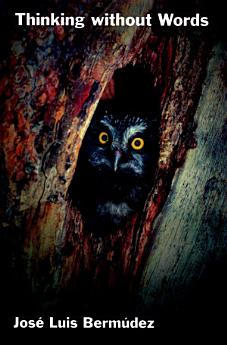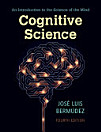Thinking without Words
ਅਕਤੂ 2007 · Oxford University Press
ਈ-ਕਿਤਾਬ
240
ਪੰਨੇ
family_home
ਯੋਗ
info
reportਰੇਟਿੰਗਾਂ ਅਤੇ ਸਮੀਖਿਆਵਾਂ ਦੀ ਪੁਸ਼ਟੀ ਨਹੀਂ ਕੀਤੀ ਗਈ ਹੈ ਹੋਰ ਜਾਣੋ
ਇਸ ਈ-ਕਿਤਾਬ ਬਾਰੇ
Thinking without Words provides a challenging new theory of the nature of non-linguistic thought. Many scientific disciplines treat non-linguistic creatures as thinkers, explaining their behavior in terms of their thoughts about themselves and about the environment. But this theorizing has proceeded without any clear account of the types of thinking available to non-linguistic creatures. One consequence of this is that ascriptions of thoughts to non-linguistic creatures have frequently been held to be metaphorical and not to be taken at face value. Bermúdez offers a conceptual framework for treating human infants and non-human animals as genuine thinkers. Whereas existing discussions of thought at the non-linguistic level have concentrated on how such thoughts might be physically realized, Bermúdez approaches the problem by considering what is required in explaining behavior in psychological terms. In developing a positive account of non-linguistic thought he shows how the experimental tools used by developmental psychologists and students of animal behavior can be used to give a precise account of the way in which a human infant or non-human animal is representing the world. Much of the book is devoted to exploring the differences between thinking without words and language-based thinking. Bermúdez argues that there are clear limits to the expressive power of non-linguistic thought. Nonetheless, he identifies primitive analogues at the non-linguistic level that can be used to explain sophisticated non-linguistic behaviors. Thinking Without Words is the first full-length philosophical study of this important topic. It is written with an interdisciplinary readership in mind and will appeal to philosophers, psychologists, and students of animal behavior.
ਲੇਖਕ ਬਾਰੇ
Jose Luis Bermudez is Professor of Philosophy at Washington University in St. Louis.
ਇਸ ਈ-ਕਿਤਾਬ ਨੂੰ ਰੇਟ ਕਰੋ
ਆਪਣੇ ਵਿਚਾਰ ਦੱਸੋ
ਪੜ੍ਹਨ ਸੰਬੰਧੀ ਜਾਣਕਾਰੀ
ਸਮਾਰਟਫ਼ੋਨ ਅਤੇ ਟੈਬਲੈੱਟ
Google Play Books ਐਪ ਨੂੰ Android ਅਤੇ iPad/iPhone ਲਈ ਸਥਾਪਤ ਕਰੋ। ਇਹ ਤੁਹਾਡੇ ਖਾਤੇ ਨਾਲ ਸਵੈਚਲਿਤ ਤੌਰ 'ਤੇ ਸਿੰਕ ਕਰਦੀ ਹੈ ਅਤੇ ਤੁਹਾਨੂੰ ਕਿਤੋਂ ਵੀ ਆਨਲਾਈਨ ਜਾਂ ਆਫ਼ਲਾਈਨ ਪੜ੍ਹਨ ਦਿੰਦੀ ਹੈ।
ਲੈਪਟਾਪ ਅਤੇ ਕੰਪਿਊਟਰ
ਤੁਸੀਂ ਆਪਣੇ ਕੰਪਿਊਟਰ ਦਾ ਵੈੱਬ ਬ੍ਰਾਊਜ਼ਰ ਵਰਤਦੇ ਹੋਏ Google Play 'ਤੇ ਖਰੀਦੀਆਂ ਗਈਆਂ ਆਡੀਓ-ਕਿਤਾਬਾਂ ਸੁਣ ਸਕਦੇ ਹੋ।
eReaders ਅਤੇ ਹੋਰ ਡੀਵਾਈਸਾਂ
e-ink ਡੀਵਾਈਸਾਂ 'ਤੇ ਪੜ੍ਹਨ ਲਈ ਜਿਵੇਂ Kobo eReaders, ਤੁਹਾਨੂੰ ਫ਼ਾਈਲ ਡਾਊਨਲੋਡ ਕਰਨ ਅਤੇ ਇਸਨੂੰ ਆਪਣੇ ਡੀਵਾਈਸ 'ਤੇ ਟ੍ਰਾਂਸਫਰ ਕਰਨ ਦੀ ਲੋੜ ਹੋਵੇਗੀ। ਸਮਰਥਿਤ eReaders 'ਤੇ ਫ਼ਾਈਲਾਂ ਟ੍ਰਾਂਸਫਰ ਕਰਨ ਲਈ ਵੇਰਵੇ ਸਹਿਤ ਮਦਦ ਕੇਂਦਰ ਹਿਦਾਇਤਾਂ ਦੀ ਪਾਲਣਾ ਕਰੋ।







